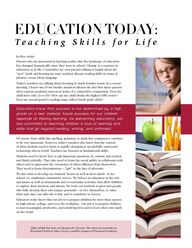
Return to flip book view
Parents who are interested in learning realize that the landscape of education has changed dramatically since they were in school. Change is a constant in education as in life: I remember my own parents talking at length about the “new” math and hearing my sons’ teachers discuss reading skills in terms of phonics versus whole language.Today’s teachers are talking about learning in much broader terms. In a recent meeting, I heard one of our faculty members discuss the fact that many parents often express academic success in terms of a competitive comparison. Does my child have only A’s or B’s? How can my child obtain the highest ERB scores? Does my second grader’s reading range reflect fourth grade skills?Educators know that success is not determined by a high grade on a test. Instead, future success for our children depends on lifelong learning. As elementary educators, we are committed to teaching children a love of learning and skills that go beyond reading, writing, and arithmetic.Of course, basic skills like spelling, grammar, or math fact competency continue to be very important. However, today’s teachers also know that the content of what students need to learn is rapidly changing in our globally connected, technology-driven world. Teachers are focused on fundamental skills.Students need to know how to ask important questions, be curious and excited, and think critically. They also need to learn the social agility to collaborate with others and to appreciate the viewpoints of others different from themselves. They need to learn determination — “grit” in the face of adversity.We also want to develop our students’ hearts as well as their minds. At my school, we emphasize community service. We believe in education in the arts and music as well as intramurals and co-curricular activities that allow children to explore their interests and talents. We want our students to grow into people who fully develop their own unique potential — to love themselves, to value what only they can offer the world, and to contribute to society.Educators today know that our job is to prepare children for more than success in high school, college, and even the workplace. Our job is to prepare children to lead meaningful, productive, and satisfying lives and to leave their own mark on the world.By Ellen AdolphEDUCATION TODAY:Teaching Skills for LifeEllen Adolph has been an educator for 24 years. She serves as counselor at Woodward North in Johns Creek, a satellite campus of Woodward Academy.